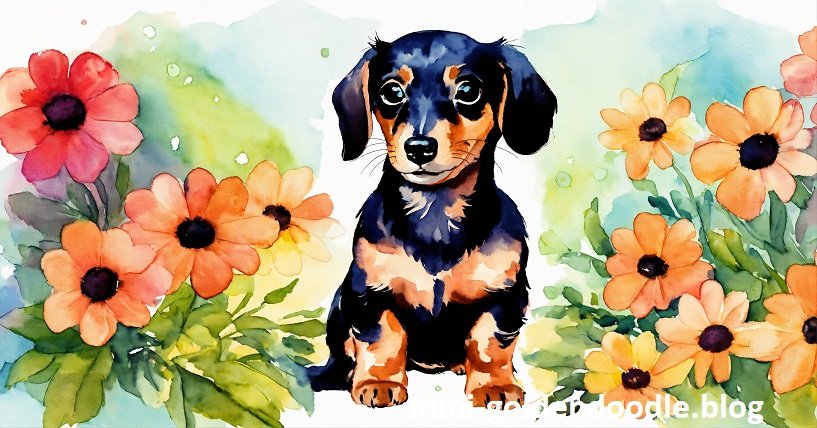Introduction
Puppies of the Dachshund dachshund puppy breed exude charm and charisma, enthralling dog enthusiasts all over the world with their unique looks and lively dispositions. Adorably referred to as “wiener dogs” or “sausage dogs,” these diminutive yet powerful dogs have a lengthy history dating back to Germany, where they were first developed as hunting dogs. They are adored as devoted family pets and faithful companions today, known for their playful disposition and unshakable commitment to their owners. Whether you already own a Dachshund puppy or are thinking about getting one, this in-depth guide will provide you all the knowledge you need to maintain their wellbeing.
History and Origin
German hunting customs have given Dachshunds a long and illustrious heritage dating back centuries. Their elongated bodies and small legs let them to easily navigate into underground tunnels, which was why they were bred largely to hunt badgers and other burrow-dwelling creatures. Dachshunds gained recognition over time for their courage, intelligence, and bravery in the face of difficult terrain.
Types of Dachshunds
Dachshunds come in various sizes and coat types, each with its own distinct characteristics and charm. Standard Dachshunds are the largest and most commonly recognized, while Miniature Dachshunds offer a smaller, more compact version ideal for apartment living. Long-haired Dachshunds boast a silky coat that requires regular grooming, whereas Smooth-haired Dachshunds have a sleek, easy-to-maintain coat.
Characteristics and Temperament
Puppies of the Dachshund breed are well known for having brave and energetic personalities. Inquisitive by nature, they have an independent streak that can be charming and sometimes difficult for owners to deal with. Dachshunds, despite their diminutive stature, radiate bravery and confidence; they frequently face unfamiliar circumstances fearlessly. They have close relationships with their families that last a lifetime since they are incredibly devoted to them.
Physical Features
Puppies of the Dachshund breed are easily identified by their unique physical characteristics. They stand out from other breeds thanks to their distinctive, low-slung appearance, which is a result of their elongated bodies and short legs. Long ears that frame their expressive faces contribute to the appeal of dachshunds and give them an alert, attentive aspect. Dachshunds have a visual diversity that appeals to dog lovers of all tastes, with a range of coat colors and patterns ranging from dappled to solid tones.
Caring for Your Dachshund Puppy
Safeguarding your Dachshund puppy’s health requires a number of important factors to take into account. It is crucial to provide them with a balanced diet that is appropriate for their size, age, and level of exercise. Their love of food and sedentary habits can make obesity a concern, therefore regular exercise is essential to preserving their health. The type of coat a dog has determines how often it has to be groomed.
Health Considerations
Prospective owners should be advised that although Dachshund puppies are mostly healthy, they are susceptible to specific health problems. They are more susceptible to back difficulties and mobility challenges because of their elongated spines, which also increase the risk of intervertebral disc disease (IVDD). Another concern is obesity, which is made worse by their propensity to overeat and, if left unchecked, low levels of activity.
Training Your Dachshund Puppy
A Dachshund puppy must be trained with patience, consistency, and an awareness of their distinct nature. Treats and praise are two examples of positive reinforcement strategies that work well to encourage learning and command compliance. Housebreaking and giving your dog a secure place to sleep can both be aided by crate training.
Living with a Dachshund Puppy
A Dachshund puppy needs to be carefully prepared and integrated into your family. Because of their length and small stature, it is imperative to provide a safe space devoid of potential risks like stairs and sharp items. A regular schedule for eating, playing, sleeping, and exercising each day gives your puppy structure and consistency and fosters a sense of security. Interactive games and quality time spent cuddling improve the bond between you and your Dachshund, promoting a caring and rewarding relationship.
Common Myths About Dachshund Puppies
Clearing some common misunderstandings about Dachshunds might help potential owners make more informed decisions. Despite what the general public believes, Dachshunds are not naturally aggressive; rather, because of their loyalty, they may act protectively. They may live in harmony and show affection and camaraderie with kids and other pets if they are socialized and trained properly. Long-haired Dachshunds’ care requirements can be met with the right upkeep and attention, but frequent grooming is still necessary to keep their coat healthy.
Fun Facts About Dachshund Puppies
In addition to their unique looks and energetic dispositions, Dachshund puppies have a plethora of fascinating trivia and anecdotes to share. Dachshunds’ reputation as cherished companions has been further cemented by the fact that countless famous people and historical figures have owned them with pride. Their ongoing appeal and cultural relevance are highlighted by their roles in popular culture, ranging from animated films to advertising campaigns.
Conclusion
In conclusion, the special fusion of charm, intelligence, and steadfast love that Dachshund puppies possess enriches the lives of their owners. You may create a supportive environment that promotes their health and happiness for the duration of their life by getting to know their background, unique traits, and particular care requirements. Embracing the joys and responsibilities of caring for a Dachshund will surely offer enormous fulfillment and companionship to your life, whether you’re starting the path of bringing a new puppy into your house or looking to strengthen your bond with an existing pet.
FAQ
Are Dachshunds good with children?
When raised and socialized appropriately, dachshunds and children can develop close relationships. They make good friends because of their loyalty and playful attitude, but interaction should be supervised to guarantee both parties’ safety and respect.
How much exercise do Dachshund puppies need?
Frequent, moderate exercise helps Dachshund puppies stay healthy and avoid obesity. It is advised that they engage in interactive play and daily walks to keep their minds and bodies engaged.

